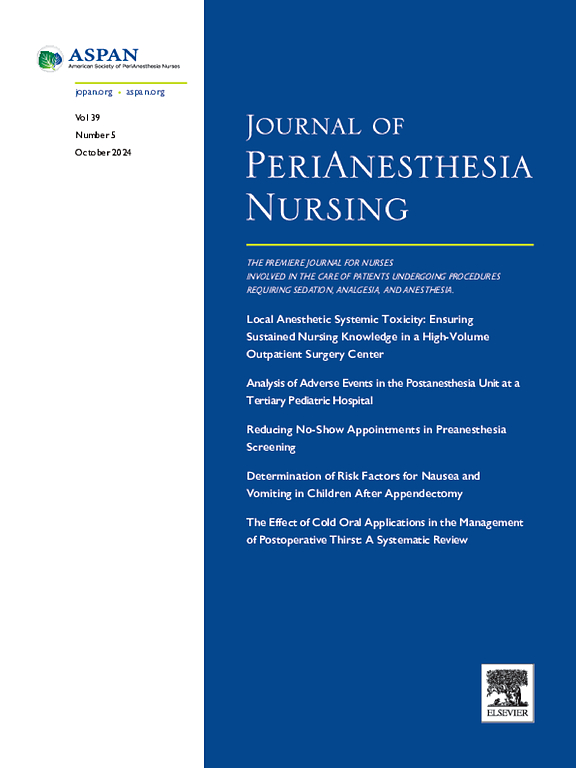Effectiveness of Peer-Based and Conventional Video Education in Reducing Perioperative Depression and Anxiety Among Coronary Artery Bypass Grafting Patients: A Randomized Controlled Trial
IF 1.6
4区 医学
Q2 NURSING
引用次数: 0
Abstract
Purpose
Depression and anxiety are common comorbidities in patients undergoing coronary artery bypass grafting (CABG), with potential adverse effects on surgical outcomes. Effective interventions to reduce depression and anxiety in these patients are therefore warranted. This study investigated the effectiveness of peer-based video education compared to conventional video education in reducing perioperative depression and anxiety in CABG patients.
Design
A three-arm, parallel, randomized, controlled trial design was employed.
Methods
A total of 114 participants were randomly assigned to 1 of 3 groups (n = 38 per group): standard education (control), conventional video education, and peer-based video education. State anxiety levels were measured using the Spielberger State Anxiety Questionnaire at 1 day before surgery (baseline), 1 hour before surgery, and 4 weeks after surgery. Depression levels were measured using the Beck Depression Inventory Short-Form at baseline and 4 weeks after surgery. Statistical analyses, including χ2, Fisher's exact test, one-way analysis of variance, and repeated-measures analysis of variance, were applied to analyze the collected data.
Findings
Both peer-based and conventional video education groups demonstrated lower preoperative anxiety levels compared to the control group. However, only the peer-based video education group exhibited a statistically significant difference (P < .05). Four weeks after surgery, anxiety and depression levels decreased in all participants compared to baseline, with no statistically significant differences among the three groups.
Conclusions
Our findings suggest that peer-based video education is more effective in controlling preoperative anxiety in patients undergoing CABG than conventional video education and standard education. Moreover, video-based education, whether conventional or peer-based, appears to be as effective as standard education in reducing anxiety and depression 4 weeks after CABG surgery. Further research is warranted to investigate the influence of content and presentation methods on patient outcomes and explore the potential long-term benefits of video-based education in promoting patient care.
同伴教育和传统视频教育对减轻冠状动脉旁路移植术患者围手术期抑郁和焦虑的效果:随机对照试验
目的:抑郁和焦虑是接受冠状动脉旁路移植术(CABG)患者的常见并发症,可能会对手术效果产生不利影响。因此,需要采取有效的干预措施来减轻这些患者的抑郁和焦虑。本研究调查了基于同伴的视频教育与传统视频教育相比在减少 CABG 患者围术期抑郁和焦虑方面的效果:设计:采用三臂、平行、随机对照试验设计:共有 114 名参与者被随机分配到 3 组中的一组(每组 38 人):标准教育组(对照组)、传统视频教育组和同伴视频教育组。在手术前 1 天(基线)、手术前 1 小时和手术后 4 周,使用斯皮尔伯格状态焦虑问卷(Spielberger State Anxiety Questionnaire)测量状态焦虑水平。抑郁水平是在基线和术后 4 周使用贝克抑郁量表短式进行测量的。统计分析包括χ2、费雪精确检验、单因素方差分析和重复测量方差分析:与对照组相比,同伴视频教育组和传统视频教育组的术前焦虑水平都较低。结论:我们的研究结果表明,同伴视频教育和传统视频教育组的术前焦虑水平均低于对照组,但只有同伴视频教育组的差异具有统计学意义(P):我们的研究结果表明,与传统视频教育和标准教育相比,同伴视频教育能更有效地控制接受 CABG 患者的术前焦虑。此外,无论是传统视频教育还是同伴视频教育,在减轻 CABG 术后 4 周的焦虑和抑郁方面似乎与标准教育一样有效。我们有必要进一步研究视频教育的内容和呈现方式对患者治疗效果的影响,并探索视频教育在促进患者护理方面的潜在长期益处。
本文章由计算机程序翻译,如有差异,请以英文原文为准。
求助全文
约1分钟内获得全文
求助全文
来源期刊

Journal of Perianesthesia Nursing
NURSING-
CiteScore
2.20
自引率
17.60%
发文量
279
审稿时长
90 days
期刊介绍:
The Journal of PeriAnesthesia Nursing provides original, peer-reviewed research for a primary audience that includes nurses in perianesthesia settings, including ambulatory surgery, preadmission testing, postanesthesia care (Phases I and II), extended observation, and pain management. The Journal provides a forum for sharing professional knowledge and experience relating to management, ethics, legislation, research, and other aspects of perianesthesia nursing.
 求助内容:
求助内容: 应助结果提醒方式:
应助结果提醒方式:


